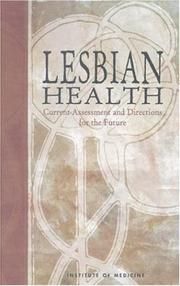| Listing 1 - 2 of 2 |
Sort by
|

ISBN: 0309060931 0309523958 0309065674 Year: 1999 Publisher: Washington National Academy Press
Abstract | Keywords | Export | Availability | Bookmark
 Loading...
Loading...Choose an application
- Reference Manager
- EndNote
- RefWorks (Direct export to RefWorks)
Fonds Suzan Daniel (FSD)
Lesbians -- Health and hygiene -- Government policy -- United States. --- Lesbians -- Health and hygiene. --- Homosexuality --- Health --- Population Characteristics --- Sexuality --- Sexual Behavior --- Health Care --- Reproductive Physiological Phenomena --- Behavior --- Reproductive and Urinary Physiological Phenomena --- Behavior and Behavior Mechanisms --- Phenomena and Processes --- Psychiatry and Psychology --- Women's Health --- Homosexuality, Female --- Public Health --- Health & Biological Sciences --- Gender Specific Public Health --- Lesbians --- gezondheid --- homoseksualiteit --- gender --- Woman's Health --- Womens Health --- Health, Woman's --- Health, Women's --- Health, Womens --- Lesbianism --- Female Homosexuality --- Female gays --- Female homosexuals --- Gay females --- Gay women --- Gayelles --- Gays, Female --- Homosexuals, Female --- Lesbian women --- Sapphists --- Women, Gay --- Women homosexuals --- Gays --- Women --- Health and hygiene. --- Health and hygiene --- Government policy --- santé --- homosexualité --- genre --- Sexual and Gender Minorities --- Psychiatry

ISBN: 0814730582 0814730590 0814732607 Year: 1994 Publisher: New York London New York University Press
Abstract | Keywords | Export | Availability | Bookmark
 Loading...
Loading...Choose an application
- Reference Manager
- EndNote
- RefWorks (Direct export to RefWorks)
Have you wondered: Why women are more sympathetic than men toward O. J. Simpson? Why women were no more supportive of the Equal Rights Amendment than men? Why women are no more likely than men to support a female political candidate? Why women are no more likely than men to embrace feminism--a movement by, about, and for women? Why some women stay with men who abuse them? Loving to Survive addresses just these issues and poses a surprising answer. Likening women's situation to that of hostages, Dee L. R. Graham and her co- authors argue that women bond with men and adopt men's perspective in an effort to escape the threat of men's violence against them. Dee Graham's announcement, in 1991, of her research on male-female bonding was immediately followed by a national firestorm of media interest. Her startling and provocative conclusion was covered in dozens of national newspapers and heatedly debated. In Loving to Survive, Graham provides us with a complete account of her remarkable insights into relationships between men and women. In 1973, three women and one man were held hostage in one of the largest banks in Stockholm by two ex-convicts. These two men threatened their lives, but also showed them kindness. Over the course of the long ordeal, the hostages came to identify with their captors, developing an emotional bond with them. They began to perceive the police, their prospective liberators, as their enemies, and their captors as their friends, as a source of security. This seemingly bizarre reaction to captivity, in which the hostages and captors mutually bond to one another, has been documented in other cases as well, and has become widely known as Stockholm Syndrome. The authors of this book take this syndrome as their starting point to develop a new way of looking at male-female relationships. Loving to Survive considers men's violence against women as crucial to understanding women's current psychology. Men's violence creates ever-present, and therefore often unrecognized, terror in women. This terror is often experienced as a fear for any woman of rape by any man or as a fear of making any man angry. They propose that women's current psychology is actually a psychology of women under conditions of captivitythat is, under conditions of terror caused by male violence against women. Therefore, women's responses to men, and to male violence, resemble hostages' responses to captors. Loving to Survive explores women's bonding to men as it relates to men's violence against women. It proposes that, like hostages who work to placate their captors lest they kill them, women work to please men, and from this springs women's femininity. Femininity describes a set of behaviors that please men because they communicate a woman's acceptance of her subordinate status. Thus, feminine behaviors are, in essence, survival strategies. Like hostages who bond to their captors, women bond to men in an effort to survive. This is a book that will forever change the way we look at male-female relationships and women's lives.
digitale publicaties --- geweld --- vrouwen --- Psychologie. --- Misshandelte Frau. --- Gewalt. --- Geschlechterbeziehung. --- Frau. --- Sexuelle Gewalt --- Mann --- Gewalt --- Misshandlung --- Frau --- Women --- Abusive men. --- Abusive men --- Abusive boyfriends --- Abusive fathers --- Abusive husbands --- Batterers, Male --- Male batterers --- Men --- Crimes against women --- Femicide --- Women victims of crime --- Psychology. --- Crimes against. --- Crimes against --- Mental health --- USA. --- United States. --- AB --- ABSh --- Ameerika Ühendriigid --- America (Republic) --- Amerika Birlăshmish Shtatlary --- Amerika Birlăşmi Ştatları --- Amerika Birlăşmiş Ştatları --- Amerika ka Kelenyalen Jamanaw --- Amerika Qūrama Shtattary --- Amerika Qŭshma Shtatlari --- Amerika Qushma Shtattary --- Amerika (Republic) --- Amerikai Egyesült Államok --- Amerikanʹ Veĭtʹsėndi͡avks Shtattn --- Amerikări Pĕrleshu̇llĕ Shtatsem --- Amerikas Forenede Stater --- Amerikayi Miatsʻyal Nahangner --- Ameriketako Estatu Batuak --- Amirika Carékat --- AQSh --- Ar. ha-B. --- Arhab --- Artsot ha-Berit --- Artzois Ha'bris --- Bí-kok --- Ē.P.A. --- EE.UU. --- Egyesült Államok --- ĒPA --- Estados Unidos --- Estados Unidos da América do Norte --- Estados Unidos de América --- Estaos Xuníos --- Estaos Xuníos d'América --- Estatos Unitos --- Estatos Unitos d'America --- Estats Units d'Amèrica --- Ètats-Unis d'Amèrica --- États-Unis d'Amérique --- Fareyniḳṭe Shṭaṭn --- Feriene Steaten --- Feriene Steaten fan Amearika --- Forente stater --- FS --- Hēnomenai Politeiai Amerikēs --- Hēnōmenes Politeies tēs Amerikēs --- Hiwsisayin Amerikayi Miatsʻeal Tērutʻiwnkʻ --- Istadus Unidus --- Jungtinės Amerikos valstybės --- Mei guo --- Mei-kuo --- Meiguo --- Mî-koet --- Miatsʻyal Nahangner --- Miguk --- Na Stàitean Aonaichte --- NSA --- S.U.A. --- SAD --- Saharat ʻAmērik --- SASht --- Severo-Amerikanskie Shtaty --- Severo-Amerikanskie Soedinennye Shtaty --- Si͡evero-Amerikanskīe Soedinennye Shtaty --- Sjedinjene Američke Države --- Soedinennye Shtaty Ameriki --- Soedinennye Shtaty Severnoĭ Ameriki --- Soedinennye Shtaty Si͡evernoĭ Ameriki --- Spojené obce severoamerick --- Spojené staty americk --- SShA --- Stadoù-Unanet Amerika --- Stáit Aontaithe Mheirice --- Stany Zjednoczone --- Stati Uniti --- Stati Uniti d'America --- Stâts Unîts --- Stâts Unîts di Americhe --- Steatyn Unnaneysit --- Steatyn Unnaneysit America --- SUA --- Sŭedineni amerikanski shtati --- Sŭedinenite shtati --- Tetã peteĩ reko Amérikagua --- U.S. --- U.S.A. --- United States of America --- Unol Daleithiau --- Unol Daleithiau America --- Unuiĝintaj Ŝtatoj de Ameriko --- US --- USA --- Usono --- Vaeinigte Staatn --- Vaeinigte Staatn vo Amerika --- Vereinigte Staaten --- Vereinigte Staaten von Amerika --- Verenigde State van Amerika --- Verenigde Staten --- VS --- VSA --- Wááshindoon Bikéyah Ałhidadiidzooígí --- Wilāyāt al-Muttaḥidah --- Wilāyāt al-Muttaḥidah al-Amirīkīyah --- Wilāyāt al-Muttaḥidah al-Amrīkīyah --- Yhdysvallat --- Yunaeted Stet --- Yunaeted Stet blong Amerika --- ZDA --- Združene države Amerike --- Zʹi͡ednani Derz͡havy Ameryky --- Zjadnośone staty Ameriki --- Zluchanyi͡a Shtaty Ameryki --- Zlucheni Derz͡havy --- ZSA --- ABŞ --- Amerikanʹ Veĭtʹsėndi͡avks Shtattnė --- É.-U. --- ÉU --- Saharat ʻAmērikā --- Spojené obce severoamerické --- Spojené staty americké --- Stáit Aontaithe Mheiriceá --- Wááshindoon Bikéyah Ałhidadiidzooígíí --- Graham. --- Likening. --- This. --- adopt. --- against. --- argue. --- bond. --- book. --- change. --- co-authors. --- effort. --- escape. --- forever. --- hostages. --- lives. --- look. --- male-female. --- mens. --- perspective. --- relationships. --- situation. --- that. --- them. --- threat. --- violence. --- will. --- with. --- women. --- womens.
| Listing 1 - 2 of 2 |
Sort by
|

 Search
Search Feedback
Feedback About UniCat
About UniCat  Help
Help News
News